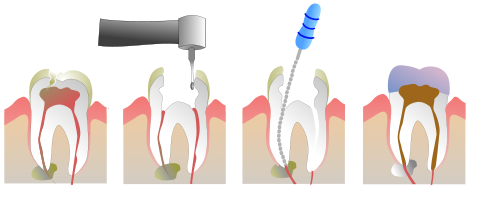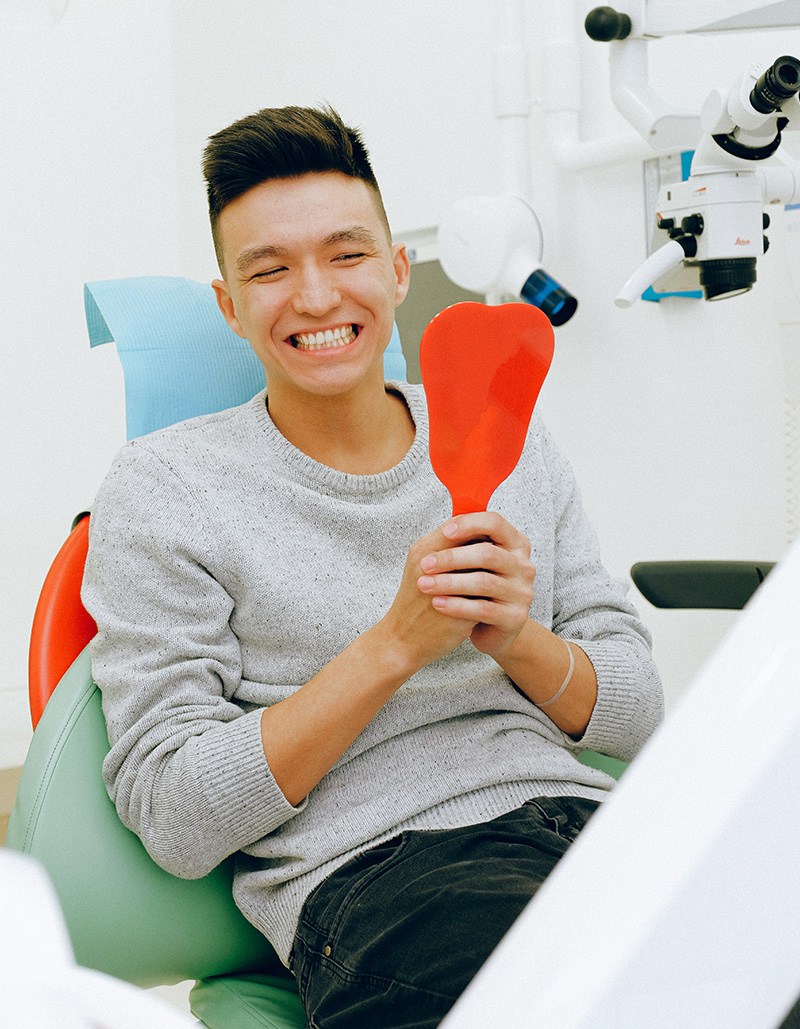Summary: A root canal is a way of saving a tooth that would otherwise need to be extracted. When bacteria invade the pulp chamber, that is the chamber that houses the nerve and its blood supply, a root canal is performed to clean out the chamber and seal the root ending preventing it from getting re-infected.
What is a root canal?

In the center of the every tooth there is a chamber that houses the nerve, artery, and vein-aka pulp. Any injury to the tooth can cause the pulp to deteriorate. Most injuries come in the form of tooth decay. This may cause inflammation to the pulp which will lead to sensitivity to cold. Not everyone will have pain or sensitivity with tooth decay. As a matter of fact, a slow moving decay will not likely cause any symptoms. Only fast moving acute conditions will result in symptoms.
When decay gets large, it can invade the chamber that houses the pulp. Bacteria will then infect the pulp, and cause severe inflammation to the pulp. The chamber fills with blood and has nowhere to go. At this point, you will likely have sensitivity to hot and, may also feel a pulse like throbbing. What happens is that heat causes the expansion of blood inside the chamber. This will cause an increase in the pressure within the chamber which will start to crush the pulp. In addition as your heart beats, it pushes blood to your extremities. This will temporarily increase the pressure within the chamber leading to a throbbing pain. Within several days or weeks, the pulp will die and dry out. In the next phase the tooth may stop hurting and be without symptoms. However, since the pulp chamber is filled with bacteria, it will start to spill out bacteria from the apex of the tooth into the surrounding areas. Since the pulp chamber’s blood supply has dried out, antibiotics may contain the infection, but will not cure it. The bacteria replicate and increase in number. They start to apply pressure to the surrounding bone. This will cause the destruction of the adjacent bone. Most infections will find the least resistance path through the bone and into the mouth. Other times, the infection can be dangerous, and head upwards toward the brain. Some infections will start to feed off the tissue of their surrounding. At this point the face will get swollen. Unfortunately, prescription antibiotics may not be enough, and you may need to go to the emergency room for IV antibiotics.
Does it hurt?
Majority of root canals do not hurt. A very small percentage of patients who waited too long may experience some pain. In case of large infections, the anesthetic is ineffective because they are inactivated by the infection. Also, if you have a tooth that is hot(hurting) it may be difficult to numb. Many patients do not seek treatment until the tooth starts hurting. I always tell them by that time, I may not be able to stop the pain. So if you have heard someone say that their root canal hurt, it is because they waited too long.
How do you do a root canal?
The idea is to remove the entire pulp and any bacteria from the tooth and seal the apex so it cannot get reinfected. This is done by first opening the head of the chamber. Next metal files are inserted into the chamber to scrape the wall of any bacteria and pulp. Solutions are use to dissolve the pulp and kill the bacteria. Once inside, the chamber is cleaned, a sealer is placed inside the tooth preventing it from getting reinfected.
Do I need a root canal?
If you have any of the following symptoms, you may need a root canal:
1. Severe or prolonged sensitivity to cold
2. Sensitivity to hot
3. Throbbing pulsating pain
4. Pain that keeps you up or wakes you up at night.
5. Your tooth suddenly feels like your normal bite is “off”.
6. You feel pain with pressure or when you tap on the tooth.
7. Your face is swollen.
If you suspect you need a root canal, see your dentist right away.
Also, watch the video on my my web page.
At Oasis Dental Arts, your Scripps Ranch dentist does the majority of his root canals saving you time and money.
